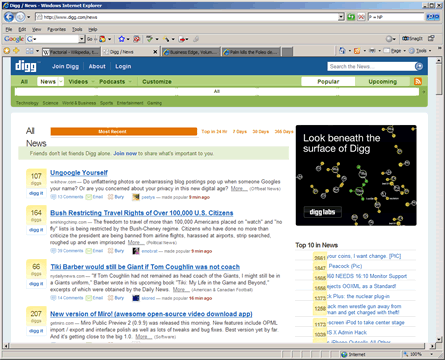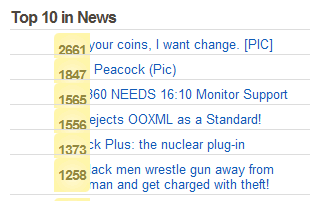Worst or best named book chapters in a book
Wednesday, September 26, 2007
I was browsing through the local Chapters bookstore and came across a book that had the worst (or best) named chapters in a book. The chapters were named as follows:
Chapter 1
Chapter 2
Chapter 3
Chapter 4
...
Chapter 12
I thought it was funny, but rude. Giving a distinctive name to each chapter is not only courtesy to the reader but also good advertising: how is a consumer to know what the book is all about?
To give credit to the publishing house, the book had a title, as opposed to the literal "Book Title." Now, that would have been really funny. The cover would have look something like the following:
Book Title: Book Subtitle
Written by: an Author
Published by: a Publishing House, from a City, in a Country
Date published: the Date of Publishing
Undocumented google feature: change language on the fly
Friday, September 21, 2007
So I found how to fix my google language setting. I think it's one of those undocumented features: in the address bar, type www.google.com/<language_code> and that will do the trick.
For example, click on the following links:
www.google.com/fr - French.
www.google.com/uk - Ukrainian.
This is how I got in trouble: I was trying to search for things in the United Kingdom (UK) and just typed "uk" after the forward slash in the address bar (after google.com) and changed my settings to the Ukrainian language instead.
Don't forget to do "
www.google.com/en" to go back to English.
How many language codes are there anyway? There are a few, but not all of them are supported by your browser, unless you have the proper fonts installed. You can find a full list from the
Library of Congress site.
Idiot proof google interface? Not so fast...At least in my case.
As in any application, users always find weird ways to do things--even in the most minimalistic applications. I mean, how complicated is google's UI? Not very, as we all know. Nonetheless, I found a way to screw things up and now the site is unusable to me.
Somehow, I clicked something that changed the interface into a different language other than English. By the look of the symbols, I think it's Russian, but I'm not sure and I can get it back to normal.
This is what google looks like on my browser:

I'm almost certain that google's engineering group already saw this and have a solution to my problem: how to make google display in English again.
Aside from deleting google's cookie, do you know how I can get google to display in English again?
CDN $ > US $
Thursday, September 20, 2007
The price of the Canadian dollar hasn't been at par with the US dollar in 30 years,
they say. This, of course, is good news and bad news. On the one hand, importers will buy, relatively, cheaper US raw materials. On the other hand, exporters will have a hard time selling their finished products.
In the end, the US dollar will eventually appreciate, but for now we can look forward to paying more for already marked US merchandise that is in the country. For example, books are said to be priced months ahead of time: the same book in the US is worth $35, and in Canada $42. That's quite a difference, and I don't like it, so I recommend importing.
European Football Weekend Review
Monday, September 17, 2007
You know there is always someone recording professional soccer games around the world, and there is always someone posting these recordings online somewhere. I always look for them, but the problem is finding them all in one place.
Today, I found the next best thing: a Spanish blog that collects the shorts of most of the important European games. Behold,
futvolblog.es.
The content is in Spanish, but a celebration of a "Goooool" sounds the same in almost every language.
The Oreo Pizza
Friday, September 14, 2007
I didn't know this thing really existed. I like Oreo cookies as much as the next guy, but a pizza made of Oreos is a bit much for me. I can only eat 3 Oreos in one sitting now: they are too sweet.
Kids must love this thing...
Webactors? Not for me...
Thursday, September 13, 2007
One of the great things about the internet is the pull nature of the content. Pull, of course, means that I only click on the links that seem to be of value to me--in contrast to push, where content is delivered without my control, for example, TV or radio. (I think this is why pop over/under advertising is vilified.)
So what would you think if you could make the web more like a TV commercial, or rather, an interinfomercial? I find the concept creepy, for some reason.
Would you buy anything from a site with
one of these?
Sea water as fuel
Monday, September 10, 2007
This would definitely be an alternative fuel source, if it pans out to be cheaper to get a flame going than the actual total energy to create the flame:
John Kanzius, a Washington County native, tried to desalinate seawater with a generator he developed to treat cancer, and it caused a flash in the test tube.
Within days, he had the salt water in the test tube burning like a candle, as long as it was exposed to radio frequencies. (Salt water as fuel? Erie man hopes so
Hasn't sea water existed since the beginning of time? (Well, earth time.)
iPod touch's killer app == YouTube
Thursday, September 06, 2007
I've only seen the iPod touch in photographs and I saw the video of Steve's
key note address, but I have a feeling the killer app for this new toy is the Wi-Fi card + YouTube. And when I mean killer app, I mean to leave out every feature in the device. Everything in the iPod touch just wants to be touched.
It's a given that this thing will sell millions. The question now is why get an iPod touch when you can get an iPhone?
Why social-network companies will dissapear
Wednesday, September 05, 2007
I started writing this entry on July 28, 2007, but stopped short of publishing it, as I got tied up with academic work.
Today I read an article on Technology Review that reminded me of my musings: "
Build Your Own Social Network." I see it fitting with what I was thinking at the time.
This is my original entry.
I have been thinking about the success of sites like digg.com and facebook.com. I think usage-evolution will put these babies out of business. The way I see it is that social networks will just spurt up with no need to have a central location. And then they'll die down when nothing interesting is happening anymore. Say, when there are too many pictures of cute cats in the top pages (a la digg.com).
As a user, does it matter if you have an affiliation to these social network sites? I don't think so. When they are cool, probably. But once everyone and their dog join them, it kind becomes a drag and probably uncool.
What we need is the concept of virtual flash mobs. In the same sense that regular flash mobs just gather to do something crazy (or stupid), these social virtual networks should just come up and disappear in a similar manner.
Social web mobs will revolve around themes and special interests. In other words, they won't be meta-social networks where gaming the system to bring stories to the top of the heap is actually a business. No, these flash web mobs will be driven by real content and real contributors.
Personally, I don't like giving too much power to these free applications providers. I use them, and from time to time contribute to them, but as they say: "garbage in, garbage out." And what I've found lately is that the garbage that was popular in 2000 is now making it back into these news-aggregation sites. I know why this happens (demographic changes), but what is the point of re-reading old stories? I can't wait until the dancing baby makes a come back.
Furthermore, what's the point of giving all the power and information to only one company? This is one of the reasons I don't join facebook or myspace. Also, the value I would get from using these sites doesn't justify my time investment. I'm not saying that these sites should not exist; on the contrary, without them many people would not have endeavored into the habitat that the web is. I'm also not saying that there is no value in the social-graph. Of course, there is great value. What I'm saying is that centrally controlled meta-social networks are not self sustainable, and will eventually give way to a social-network-building utility.
Of course, these social-network-building utilities will only be available until the majority of web users learn how to set up their own domain name and hosting application. Then, what's the point of a social network? For example, I have created my own social network: my website. The comments posted for each entry are spontaneous social networks. Albeit my networks are small, but they are networks nonetheless. And they disappear quite rapidly. For example, if you leave a message in this entry, it is likely you will not come back. You may comeback for some other entry and leave your message then, but that will be it for that flash-network.
(For now, I will ignore the argument of having spontaneous content provided in the form of comments. They do add value, for sure, but just read through digg's or youtube's comments and perhaps the value proposition will be rethought.)
I think we are doing the social networking thing OK for now, but creative destruction will take its course: digg, facebook, or whatever other company likely to pop-up will either transform or disappear. The "social graph" will grow on the fly from using a social-network utility. The actual destination will be the flash web mob, for the brand name is likely to be irrelevant.
So, I think VCs will start looking at this model I'm proposing: a spontaneous social networking utility. No need for facebook, or digg, or reddit, or slashdot. If something is interesting, it will have a social network around it.
After reading about the work
ning is doing, I have found validation of my view of the future. There will likely be more nings popping up, as the lifespan of centrally controlled social networks is probably reaching its limits. Probably not today, but sometime...
BTW, pointing out that "I don't get the Web 2.0 thingy" is not a valid argument. True enough, our youth like to share everything on these sites, but that will likely stop at some point, thus decreasing the value of the centrally controlled brand. The question will not be "are you on myspace or facebook." The question will likely be "are you on MY (self created) web spaces."
Heads rolling at Palm? Nope...
Tuesday, September 04, 2007
The
Foleo is gone at Palm. It's a good move, as it seemed that this thing wasn't getting any traction in the hand-held
gadget world.
One has to wonder, though, how a product that didn't quite fit anywhere make it so far.
I'm not sure that an "
oops" message will be enough to appease shareholders. The Foleo was a $10 million mistake: it's a mistake that is 2.5% of revenues of Palm's last quarter, as reported on google's finance
site. But it's all good: "This is a lot of money, but it is a small price relative to the costs that would be required to support two platforms going forward." Cool...it's a small price to pay...
Someone will have to answer really tough questions at the next shareholders' meeting. Some question that are likely to be asked:
- Who authorized the development of the Foleo?
- How are we managing innovation inside of the company?
- What is our market focus?
These are probably tamed, but one has to wonder why it took so long to realize the following (as written by Palm's CEO on Palm's blog): "Foleo is based on second platform and a separate development environment, and we need to focus our efforts on one platform. Our own evaluation and early market feedback were telling us that we still have a number of improvements to make Foleo a world-class product, and we can not afford to make those improvements on a platform that is not central to our core focus. That would not be right for our customers or for our developer community."
Their own early market research identified some red flags, yet they continue development? Of course, we don't know the whole story, but a red flag is a red flag.
On the positive side, innovation thrives in organization where everyone is allowed to make mistakes. I don't mean just any mistake, but calculated risk taking is part of any innovative high-tech organization. And so Jeff Hawkins and Ed Colligan are planning for a Foleo II. They know that the Foleo II has to be way better than any of the smart phones to be available then: I really don't think RIM is just sitting on their success to date; and it is likely the iPhone will get better and better; on top of that, google is likely to release their own google phone.
Ed, let me tell you, the competition will be tough.
On a side note, it is interesting to look at historical news reports about the Foleo. There were some reports that its release was going to be delayed. To the rescue came Jim Christensen, director of communications, stating that
the rumors were false. But then, Ed said that the core OS was going to be delayed until
next year. And now, the project is canceled. Crazy stuff...
QA, anyone? Digg QAing?
It is not easy to deploy and maintain a popular web application; however, quality standards should be observed.
Digg has made a few changes on their site, but not the changes the majority want (the comments section is still painfully broken). The latest changes include the addition of new subcategories (but no an images section) and a couple of changes of their images (and CSS).
I wonder if digg has a QA department? Maybe they don't and let the crowd to find and
report their bugs--it's the Web 2.0 way, I guess, but I'm not falling for it and won't report for free. On the other hand, I can create detailed bug reports on my site (for free). This is a very minor bug, but a bug nonetheless:

The background colour is not flushed with the border of the image. This is very noticeable, but nobody is fixing it.
The biggest problem I found, though, is that the site looks really bad on IE7. I know IE7 is not the best target for the latest standards, but in any production environment this shouldn't happen. For example, the web applications I develop (and have developed) must work in IE6/7 and FireFox. If the applications don't work on these 3 browsers, it is considered to be broken.
This is how it looks in IE7 (click the image to see the original size):

Details of the subcategory menu:

Details of the "All News" title:

Details of the "Top 10" menu:

Again, IE7 is not the most compliant browser when it comes to web standards, but I think digg.com should display consistently on the most popular browsers. Further, there are a lot of people using IE7 now a days, and this is not 1993, when every site had a disclaimer stating that "this site is best viewed with Mosaic version 2.1 at 800x600 resolution." (I know, I created a couple of those.)
Of course, digg.com is free application so our expectations as users are greatly lowered, but these bugs CAN be fixed.
Crazy web tools
I bet you always wanted to see where in the world website visitors come from? Despair no more.
The map, of course, becomes boring if nobody is in the site, but you are guaranteed to have at least one glowing dot. I think that to make the whole experience more appealing, a Pac-Man should go around the map eating the dots as visitors leave the site. Now, that would be entertaining.
I'm still not sure what the revenue model is, but maybe:
- Provide free tools...
- ?
- Profit!!!
Surely,
ads can't be it. Isn't
everyone blocking ads these days?